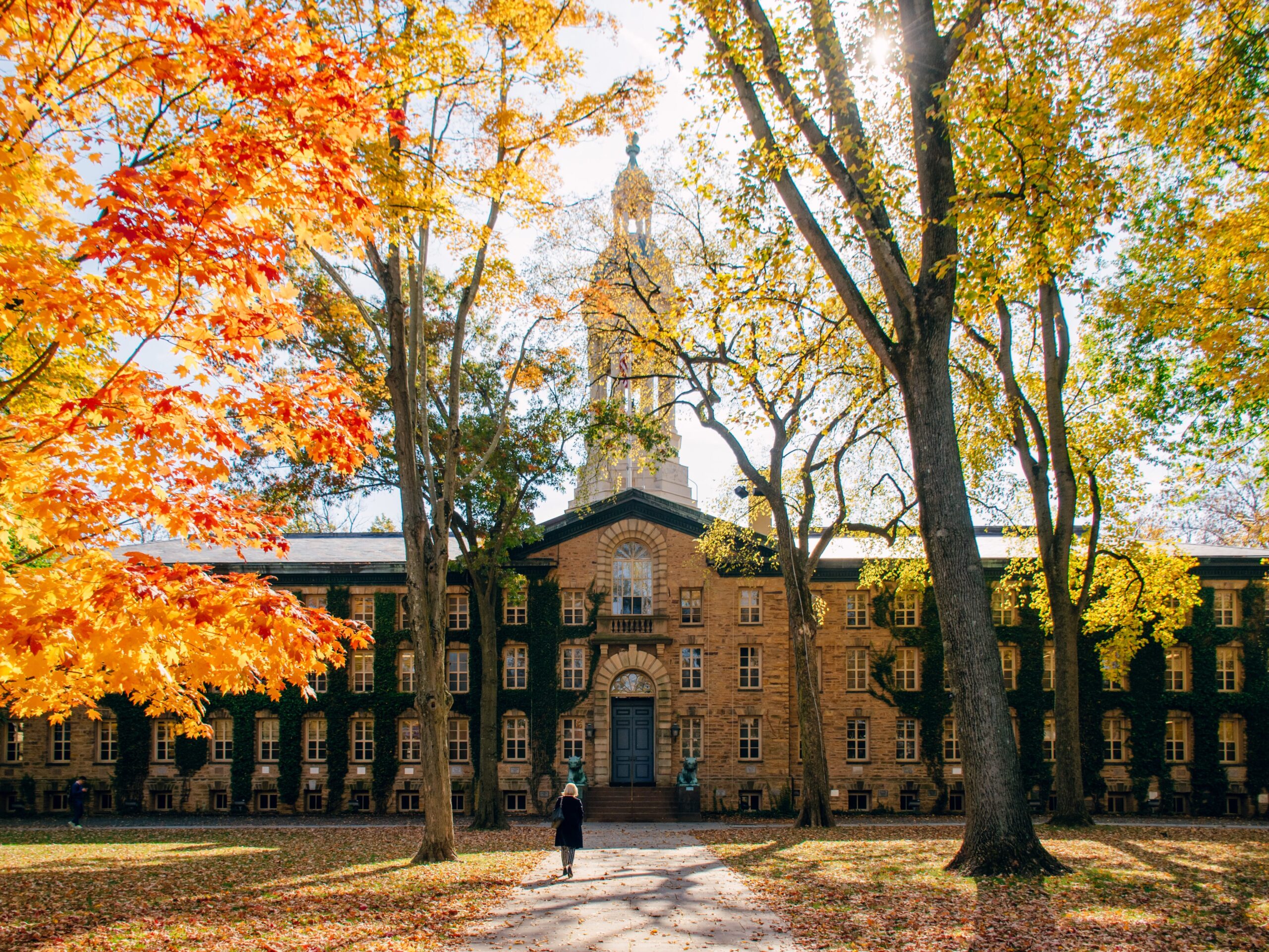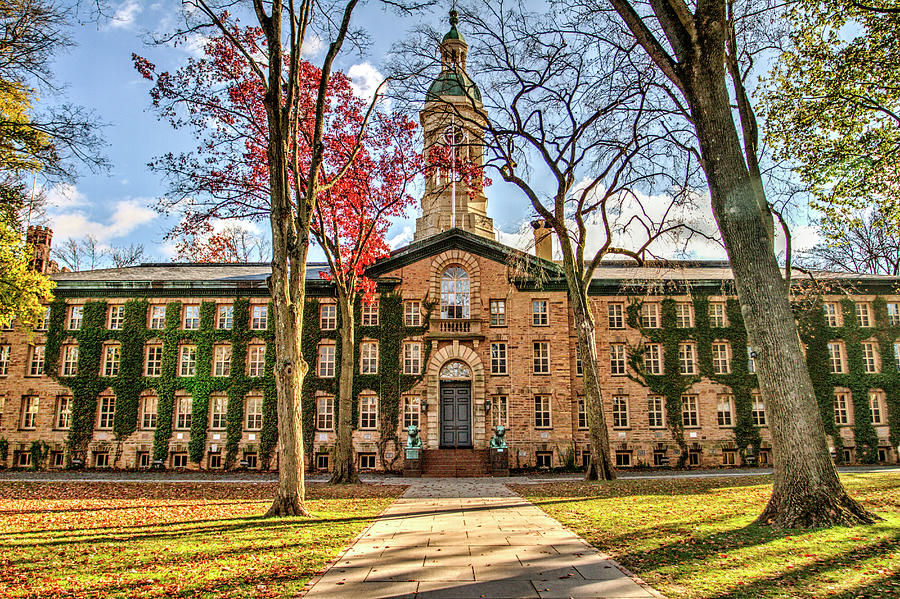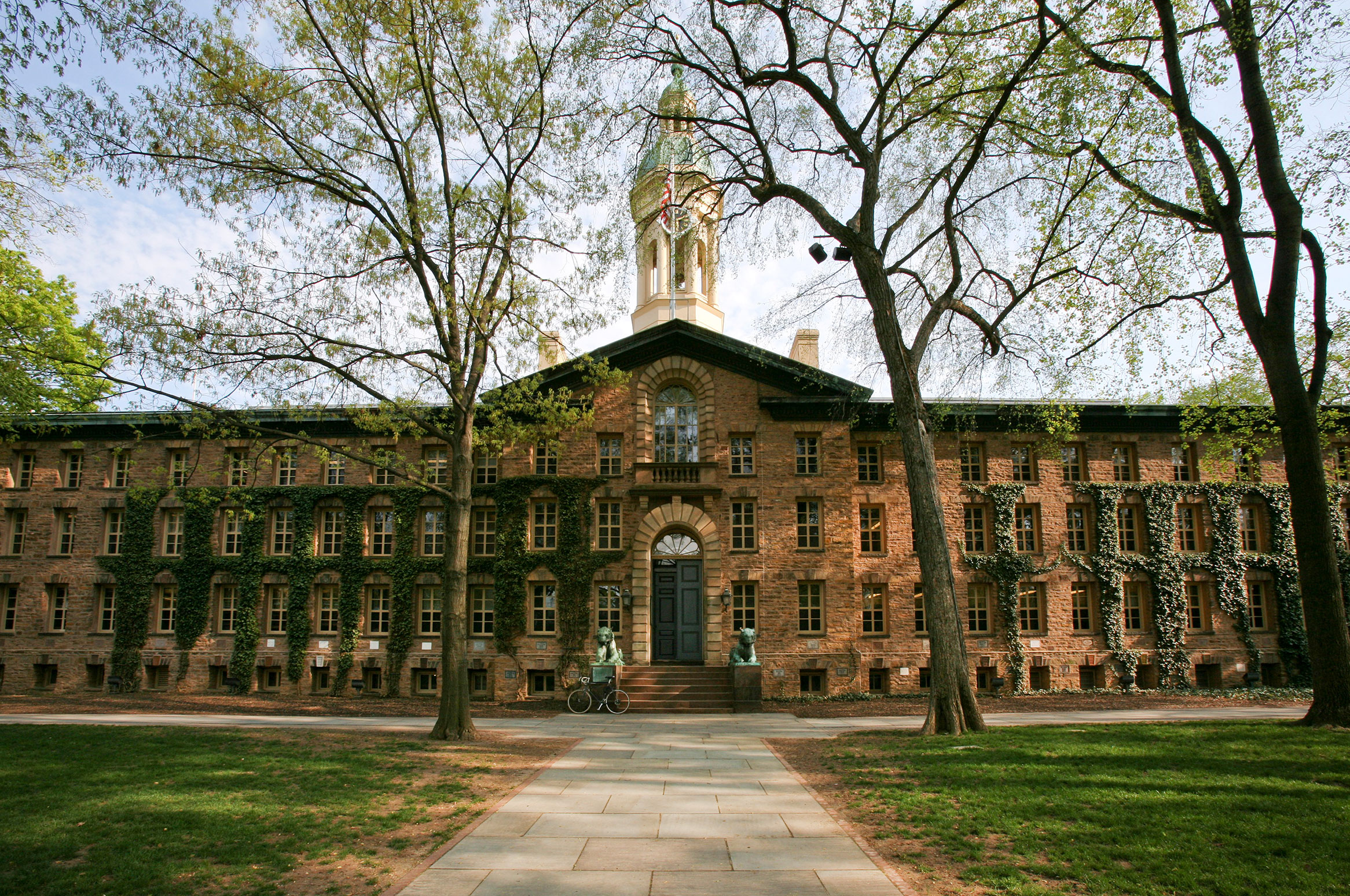Princeton University - A Place For Big Ideas And Community
Princeton University is a spot where people come together from all sorts of places, from every part of the planet, to share what they know and how they see things with one another. It's a truly special kind of gathering, bringing together folks with different life stories and ways of thinking. You see, this university really values the varied experiences that each student brings to the table, creating a rich mix of ideas and viewpoints that helps everyone grow.
This academic home, you know, is very much focused on making learning better through careful study, thoughtful investigation, and top-notch instruction. There's a particular focus on helping students who are just starting their college years, and also those working on their highest degrees. It's quite a distinctive approach, actually, setting a high standard for how knowledge is passed along and discovered, ensuring that the foundational teaching is as strong as the advanced scholarly pursuits.
Princeton is also, quite simply, a place that reaches across the globe. There are so many chances, honestly, for students to learn and to do their own research far beyond the actual campus grounds. These extensive programs, which cover a lot of different geographical areas, give Princeton students opportunities that are, in a way, quite unique, allowing them to gain insights and contribute to studies happening all over the world.
Table of Contents
- What Makes the Princeton University Community So Special?
- How Does Princeton University Support Learning?
- Exploring Beyond the Books - Princeton University's Global Reach
- A Community That Serves - Princeton University's Purpose
- What's the Story Behind Princeton University?
- Getting Started at Princeton University - What You Need to Know
- Shaping Futures - Princeton University's Educational Mission
- Is Princeton University Open to Everyone?
What Makes the Princeton University Community So Special?
The spirit of Princeton University, it's really something to see. It's a place where students, both those working on their first degrees and those pursuing advanced studies, come from every walk of life. You'll find people here from literally every corner of the earth, and they are all encouraged to share their individual experiences and their ways of looking at things with everyone else. This creates a very lively atmosphere, one where different ideas can bounce around and new ways of thinking can, well, blossom. It's about bringing together diverse backgrounds, you see, so that everyone can learn from each other's unique stories and insights. This sharing of perspectives is, in some respects, at the very heart of what makes this academic home so vibrant and so truly enriching for all who spend time there.
This coming together of varied viewpoints means that conversations often take unexpected turns, and that's a good thing. It's not just about what you learn from books, but also about the wisdom and understanding you gain from interacting with people who have lived lives quite different from your own. This kind of exchange, honestly, helps broaden horizons in a way that simply cannot be replicated in a more uniform setting. The university, it seems, really believes that a group of people with diverse life paths and thoughts is stronger, and more capable of original thinking, than a group where everyone is more or less the same. So, you find a lot of different people, all contributing to a collective pool of knowledge and feeling.
How Does Princeton University Support Learning?
Princeton University is, quite frankly, dedicated to pushing learning forward. It does this through scholarly work, careful investigation, and teaching that is, basically, of the very best quality. There's a particular emphasis here on both undergraduate education and doctoral education, and this approach is really quite distinct among similar institutions. The commitment to delivering such high-caliber instruction means that students at every stage of their academic journey receive a level of guidance and access to knowledge that is, truly, of the highest standard. It's about making sure that the foundations of learning are strong for newer students, while also providing the deep resources needed for those doing very advanced work. This focus, you know, helps shape minds that are prepared for significant contributions.
The way they go about this, it's pretty comprehensive. It's not just about sitting in a classroom; it's about active participation in the creation of new knowledge. Through their scholarship, which involves deep study and analysis, and through their research, which explores new questions and seeks fresh answers, the university is constantly adding to what we know about the world. And then, of course, there's the teaching itself, which is delivered by people who are often at the forefront of their fields. This combination, you might say, ensures that the learning environment is always fresh, always informed by the latest discoveries, and always aimed at fostering a deep, rather genuine grasp of subjects. It’s a place where, in a way, knowledge is both preserved and perpetually expanded.
Exploring Beyond the Books - Princeton University's Global Reach
Princeton, as an institution, has a truly worldwide outlook. There are, honestly, vast opportunities for students to learn and to carry out their research far beyond the university's own campus. This means that if you are a student here, you aren't just limited to what you can find within the physical boundaries of the school grounds. You can, for instance, participate in programs that take you to different countries, allowing you to experience other cultures firsthand while continuing your studies or investigations. These geographically extensive programs, they offer Princeton students a chance to see the world, quite literally, and to apply their learning in different settings. It's a way to broaden one's perspective in a very practical sense, connecting academic pursuits with global realities.
It's pretty amazing, actually, how much you can do outside of the immediate university setting. Whether it's working on a research project in another country, or perhaps studying a language where it's spoken every day, the options are really quite varied. This global focus means that students are encouraged to think about issues from an international point of view, and to understand how their studies connect to events and ideas around the planet. It's not just about getting a degree; it's about becoming a person who can operate and contribute on a worldwide stage. So, you get a chance to see how what you learn in the classroom applies, or doesn't apply, in different cultural contexts, which is, in some respects, quite valuable.
A Community That Serves - Princeton University's Purpose
Princeton University is, in fact, a lively place of scholarship and learning that stands ready to serve the nation, and also to serve all nations. This means that the work done here, the discoveries made, and the people educated, are all aimed at contributing to the greater good. It's not just about academic excellence for its own sake; there's a strong sense of civic duty and a desire to make a positive impact on the world. This commitment to service, you know, shapes the kind of research they do and the way they prepare their students, ensuring that their efforts have a real-world benefit. It's a pretty strong guiding principle, really, that extends beyond the classroom walls and into communities both near and far.
The idea of service is, basically, woven into the very fabric of the institution. Whether it's through scientific breakthroughs that address global challenges, or through graduates who go on to lead and inspire in various fields, the university's influence is felt widely. It's about educating people who will contribute meaningfully to society, and about creating new knowledge that will, quite literally, make a difference in the world. This sense of responsibility is something that seems to resonate with everyone connected to Princeton, from the faculty to the students. It's a place where learning is seen as a tool for betterment, not just for personal gain, but for the well-being of others, which is, honestly, a rather noble aim.
What's the Story Behind Princeton University?
The university's physical home, its campus, covers a considerable area. It's about 3,500 acres of land, owned by the university itself, located within the municipality of Princeton and also in some nearby New Jersey towns. This sprawling expanse provides plenty of room for academic buildings, residential halls, sports facilities, and green spaces, creating a very pleasant environment for study and community life. It's quite a sizable piece of property, you know, offering a lot of room for growth and for all the different activities that make up a university experience. This acreage, you might say, gives the institution a solid foundation and a sense of permanence.
The history of Princeton University stretches back quite a long way. It was first given its official papers, or chartered, back in 1746, and at that time, it was known as the College of New Jersey. This name stuck for a very long time, for about 150 years, actually. What's interesting to note is that this institution was the fourth college to be established in British North America. So, it has a deep historical root, being one of the earlier places of higher learning in what would eventually become the United States. This long history means that it has seen many changes over the centuries, yet its core mission has, apparently, remained quite consistent.
Over its long history, this institution has been guided by a series of leaders. The university has had, in fact, 20 presidents who have overseen its progress and development. These leaders span a vast period of time, from the colonial era right up into the 21st century. Each president has, in their own way, contributed to shaping the university into what it is today, navigating different challenges and opportunities through the years. It's quite a lineage, really, showing a continuous thread of leadership that has helped steer the university through various historical moments and academic shifts. This long line of presidents is, in some respects, a quiet testament to the institution's enduring nature.
Getting Started at Princeton University - What You Need to Know
If you're thinking about applying to Princeton, there's a good place to find all the details. You can visit the undergraduate admission website for a lot of helpful information. This site covers everything about the various undergraduate programs that are offered, what you need to do to be considered for admission, and how to actually submit your application. What's also very helpful, honestly, is that it explains the university's rather generous financial aid program. This means that if you're worried about the cost, there's support available, and the website will walk you through how that works. It's a good first stop, you know, for anyone considering this academic path.
For those students who do receive an offer to join the Princeton community, there's even more support waiting. If you are admitted to Princeton, you can, quite literally, take advantage of the many helpful resources right on campus that are there to support international undergraduate and graduate students. These resources are put in place to help make the transition to university life as smooth as possible, especially for those coming from outside the country. During your first days on campus, you'll find assistance with things like getting settled, understanding the campus layout, and connecting with other students. It's all about making sure you feel welcome and supported as you begin this new chapter, which is, in a way, very thoughtful.
Shaping Futures - Princeton University's Educational Mission
Princeton University, you see, is very much about moving learning forward through careful study, investigation, and teaching that is of the very best kind. There's a particular emphasis on undergraduate and doctoral education that is, truly, quite special among similar places. This means that the way they teach and the way they help students discover new things is really top-tier, whether you're just starting your college journey or working on your very highest degree. It's a commitment to a standard of quality that helps shape students who are ready to make a real impact. This focus, in some respects, ensures that the educational experience is both deep and broadly enriching for everyone.
The university really encourages students to look into ideas and different ways of doing things across a wide range of subjects. This includes the humanities, which are about human culture and thought; the arts, where creativity and expression are key; the natural sciences, which explore the physical world; engineering, which applies science to practical problems; and the social sciences, which study human society. This broad approach means you're not just stuck in one area; you can explore connections between different fields, which is, honestly, a pretty cool way to learn. It helps you develop a well-rounded way of thinking, allowing you to see how different areas of knowledge connect and influence one another.
Through the teaching and the investigative work done here, the university aims to prepare people who will truly contribute to society. It also strives to develop new knowledge that will, quite literally, make a difference in the world. This is a core part of their mission: to educate individuals who are not only knowledgeable but also ready to apply what they've learned to benefit others. And it's about creating new insights and discoveries that can solve problems or improve lives on a larger scale. So, when you graduate from Princeton, you will be prepared for a future where you can, in a way, truly make your mark and help shape a better world, which is, you know, a very powerful outcome.
Is Princeton University Open to Everyone?
Princeton, it's pretty clear, welcomes applications from students who live all over the world. This means that no matter where you are from, you are encouraged to consider applying to this institution. The university looks at all applications in the same manner, which is, honestly, a very fair approach. It doesn't matter what your citizenship is, or which country you currently call home; everyone's application is reviewed with the same careful consideration. This commitment to an even playing field ensures that talent and potential are recognized, regardless of geographical origin, which is, in some respects, quite important for a global academic home.
The university is, basically, committed to this principle of reviewing everyone equally. This means that the process for applying and being considered for admission is consistent for every person who puts their name forward. They aren't looking for specific nationalities or backgrounds to fill quotas; instead, they are looking for individuals who show promise and who will contribute to the vibrant learning environment. This dedication to fairness in the application process is, you know, a key part of how Princeton builds its diverse and talented student body. It's about giving everyone a chance to show what they can do, which is a pretty good way to find truly outstanding students from all over.

Princeton University Ranking & Princeton Ranking - Expert Guide

2018 REMEMBERING MY FIRST VISIT AT PRINCETON UNIVERSITY - Touristang Pobre

Studying at Princeton | Princeton University